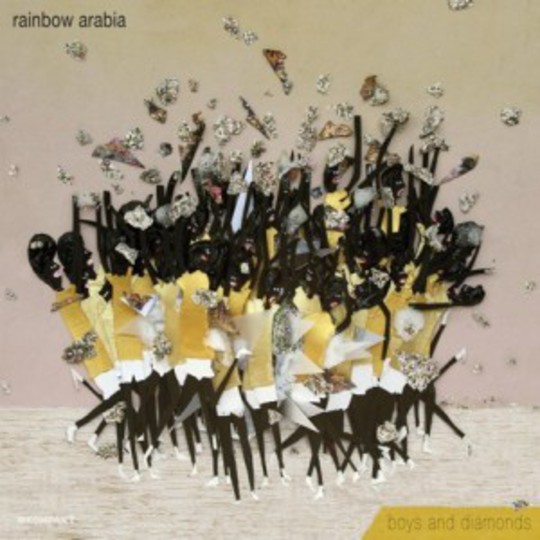Boys And Diamonds is an album that takes two different roads. A journey down one avenue finds Rainbow Arabia exploring the unrefined, bespoke freedom of African rhythms, ad hoc instrumentation and unfiltered self-expression. But there is another route being taken here, down which the duo take heavily processed electronics, technological trickery and futurist melodic manipulation. There’s something of Animal Collective in this cultural clash, a collision of civilisations, a complex coupling of man and machine.
It’s ‘This Life Is Practice’ which seems to take the most inspiration from an album like Merriweather Post Pavilion. The track is a synthetic pyramid, with melody stacked upon melody, neither quite becoming a hook, and vocals sandwiched somewhere in the middle, so muffled by reverb and inflection as to render them incomprehensible. A patter of primitive percussion gives just a hint of humanity.
The intercontinental influences are more pronounced on ‘Without You’, which opens with a clatter of tribal drumming. The synths soon dominate, but with a warmth and simplicity that prevents the technology from overcomplicating the half-drunk at sunset uplift it provides. It was an obvious choice for a single, not because there’s a great chorus that will stick in your mind for days, but because the way it makes you feel will stay with you through any summer.
However, if this melting together of simple, sunkissed vitality and complex, twenty-first-century sequencing is Rainbow Arabia’s unique selling point, they’ve sold themselves a little short on Boys And Diamonds. Here, the chasm between these two styles is too wide to really deliver on the promise of the band’s global spectrum of influences.
The plodding gloom of ‘Papai’ for example, creates a dystopian, Blade Runner-meets-The Road style mood of unnervingly faceless enigma. The stuttering samples of found objects and weaponry remind you how The Human League sounded before they reinvented pop music. And while those bongos and djembes are still there, their role is resigned to keeping the beat, making little of the splash of Technicolor these timbres can add.
The only track that perfectly combines the two sides of Rainbow Arabia’s sound is the opening title track, which takes infectious African harmonies and Caribbean guitar, stitched together with clicking hi-hats and bright plumes of soothing synth. Other tracks don’t match the eloquence of this crossover, by not allowing the tribal instrumentation to give the computer-programmed beats a jolt of life. For example, the ambient Krautrock of ‘Mechanical’ feels too robotic, without the enigma of a Kraftwerk or a Daft Punk to justify its frostiness.
By the end of Boys And Diamonds Rainbow Arabia have become, perhaps, too typically electro. The club-ready six-minutes of ‘Sequenced’ sit quite separately, but chronologically quite naturally at the rear of the record. Whereas most of the band’s electronics evoke the other-worldliness of the late Seventies/early Eighties, here they come, if not bang up to date, then at least into the Nineties with the sort of sprawling house that you’ll find on The Chemical Brothers’ Surrender or Primal Scream’s XTRMNTR. In other words, it’s nothing new.
All of this, it has to be said, is done with evident sophistication, and Rainbow Arabia have made an album that feels like a tropical party at sunset, which more often than not ditches the club for the postcard picture-perfect golden sands. But the promise of the duo’s diverse influences isn’t met, and while there are several flickers of inspired creativity, there is no overwhelming redefinition of either of the musical movements that Rainbow Arabia derive from.
-
6Robert Cooke's Score






















